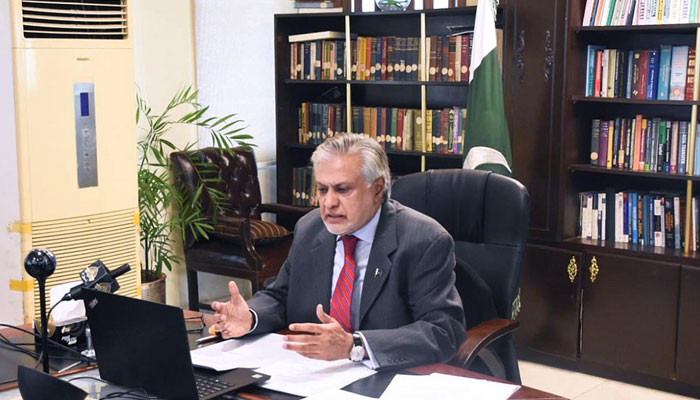Following the International Monetary Fund’s (IMF) concerns regarding the budget public, the Finance Ministry has clarified that the document is not part of the pending ninth review that has been delayed since November of last year.
In a two-page rebuttal of IMF’s Resident Representative for Pakistan Esther Perez Ruiz’s statement on the budget, the ministry on Friday stated that it was clarifying Pakistan’s position.
The ministry explained that the ninth review was conducted in early February 2023 and the government had completed “all technical issues at a fast pace”. It added that the only outstanding issue was external financing which was “amicably resolved” after Prime Minister Shehbaz Sharif spoke with the IMF managing director.
“Though the budget FY24 was never a part of the 9th Review, however in line with the PM’s commitment to the IMF MD, we shared the budget numbers with the IMF mission. And we are continuously engaged with them even on the budget,” said the ministry.
On the IMF official’s concern about the broadening of the tax base, the ministry said that the Federal Board of Revenue (FBR) has added 1,161,000 new taxpayers in the last 11 months.
“This is an ongoing exercise and will continue. The 0.6% advance adjustable withholding tax on cash withdrawals over Rs. 50,000 is another big step in this direction,” said the ministry.
The ministry also shared that the tax exemptions that have been announced in the budget are “triggers” of growth in the real sectors of the economy. “This is the sustainable path to provide employment and livelihood to the common citizen. In any case, the amount is fairly small.”
On the concerns regarding Benazir Income Support Programme (BISP), the ministry said that “pro-poor initiatives in the budget” are not confined to the beneficiaries
“There are millions of vulnerable people above the poverty line and the budget provides Rs35 billion for targeted subsidies on five main items of food consumption through the Utility Stores Corporation for families up to a PMT scorecard 40. This facility is also available for BISP beneficiaries,” the ministry said.
On the amnesty, the ministry shared that the only change is to “dollarise” the value of an existing provision of the IT Ordinance.
“This facility, which has always been there, is available under section 111(4) of the IT Ordinance. The cap of Rs10 million (approximately $100,000) was introduced in FY2016. The cap set in FY2016 is being resolved in terms of rupee equivalence of $100,000.”
The ministry assured that the government was fully committed to the IMF programme and is keen to “at least complete the 9th Review”.
“The coalition government has already taken many difficult and politically costly decisions in this context. We are not “doctrinaire” about any element of the budget FY24 and are keenly engaged with the IMF to reach an amicable solution,” the ministry added.
IMF goes public on Pakistan’s budget criticism
Earlier this week, the IMF expressed dissatisfaction with Pakistan’s budget for the fiscal year 2023-24.
The IMF said the government has missed an opportunity to broaden the tax base and reduce tax expenditures as well as terms of tax amnesty against the fund’s programme conditionality.
Seeking major changes in the budget, the Washington-based lender stated it stands ready to refine this budget ahead of its passage from the Parliament.
In response to a question about the global lender’s opinion on the budget, IMF’s Resident Chief in Pakistan Esther Perez Ruiz said the staff remains engaged (with the government) to discuss policies to maintain stability.
“However, the draft FY24 budget misses an opportunity to broaden the tax base in a more progressive way, and the long list of new tax expenditures reduces further the fairness of the tax system and undercuts the resources needed for greater support for vulnerable BISP recipients and development spending,” she said.
“The new tax amnesty runs against the programme’s conditionality and governance agenda and creates a damaging precedent,” Esther said, adding that measures to address the energy sector’s liquidity pressures could be included alongside the broader budget strategy.
It said that the IMF team stands ready to work with the government in refining this budget ahead of its passage.

